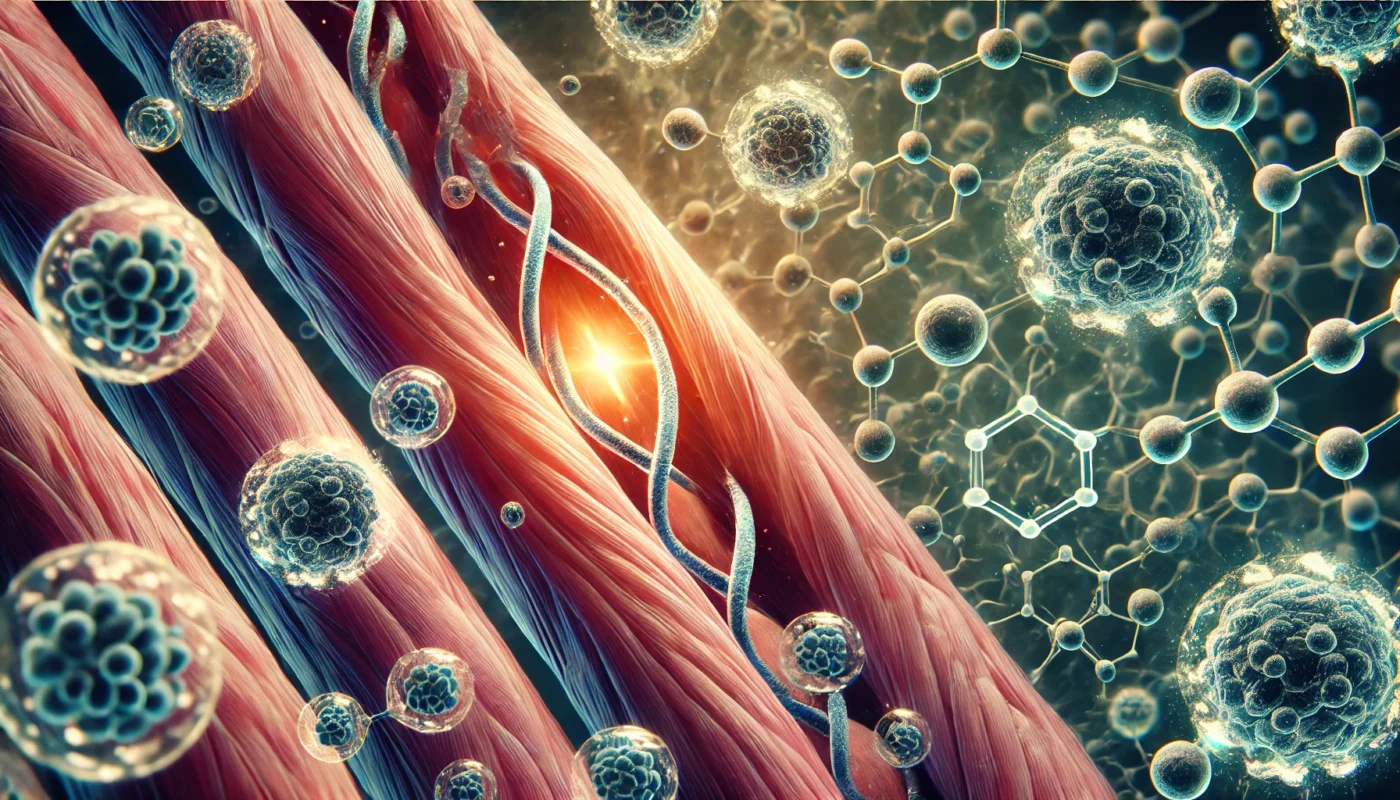Muscle growth, or hypertrophy, occurs when muscle fibers repair and increase in size following resistance exercise. Protein is vital in this process as it provides the necessary building blocks—amino acids—for muscle repair and growth. Understanding how protein contributes to muscle development can help maximize workout outcomes and enhance physical performance.
You may also like: High Protein Foods to Fuel Workouts

Understanding Muscle Hypertrophy
Muscle hypertrophy is a complex process influenced by various factors, including exercise type, intensity, and nutrition. Resistance training is a primary stimulus for hypertrophy, causing micro-tears in muscle fibers. Protein’s role in this context is to aid in the repair and enlargement of these fibers. Consuming adequate protein post-exercise is critical, as it supports muscle protein synthesis and helps prevent muscle breakdown.
The Science Behind Protein and Muscle Repair
During strength training, muscle fibers experience stress, leading to tiny tears that require repair. This is where protein becomes indispensable. Amino acids from protein serve as the building blocks for new muscle tissue, facilitating repair and growth. High-quality proteins, such as those found in animal products or supplements like whey, are particularly effective due to their complete amino acid profiles.
Optimal Protein Sources for Muscle Growth
Choosing the right protein sources can significantly impact muscle growth. Whey protein is often recommended for its rapid absorption and high leucine content, an amino acid crucial for muscle protein synthesis. Other effective sources include lean meats, eggs, and plant-based options like soy and quinoa, which provide essential nutrients needed for muscle development.
Timing and Quantity of Protein Intake
The timing and amount of protein consumed can influence muscle growth outcomes. Consuming protein-rich foods or supplements shortly after exercise maximizes muscle protein synthesis. Additionally, spreading protein intake evenly throughout the day ensures a steady supply of amino acids, supporting continuous muscle repair and growth.
Protein and Overall Growth
Beyond muscle development, protein is integral to overall growth and maintenance of body tissues. It plays a crucial role in producing hormones, enzymes, and other body chemicals essential for optimal health. Understanding protein’s broader impact on bodily functions can enhance overall health and wellness.
Protein’s Role in Tissue Development
Protein is a fundamental component of all body tissues, including skin, hair, and nails. It supports cellular repair and regeneration, ensuring that the body maintains robust and healthy tissues. Adequate protein intake is essential during growth phases, such as childhood and adolescence, to support the body’s developmental needs.
Hormonal Functions of Proteins
Proteins are involved in synthesizing hormones that regulate various bodily functions. Growth hormones, for instance, rely on protein to facilitate growth and development. Proteins also help produce insulin, which regulates blood sugar levels, and thyroid hormones, which control metabolism, demonstrating their vital role in maintaining physiological balance.
Protein and Enzymatic Activity
Enzymes, which are proteins themselves, catalyze biochemical reactions necessary for life. These reactions include digestion, energy production, and detoxification processes. Without adequate protein, enzyme production may be compromised, leading to impaired bodily functions. Thus, a balanced protein intake is vital for maintaining enzymatic activities that support health.
Protein’s Impact on Immune Function
Proteins contribute to a robust immune system by aiding in the production of antibodies and immune cells. These components are essential for defending the body against infections and diseases. Ensuring sufficient protein intake can enhance immune resilience, particularly during periods of growth or recovery.

Holistic Approaches to Protein Consumption
Understanding protein’s role in growth also involves recognizing the different sources and their contributions to a balanced diet. A holistic approach considers both animal and plant-based proteins, providing a diverse range of amino acids and additional health benefits. Integrating varied protein sources can enhance nutritional intake and support overall health.
Comparing Animal and Plant-Based Proteins
Animal proteins, such as those found in meat, fish, eggs, and dairy, are complete proteins, containing all essential amino acids required by the body. They are highly beneficial for individuals engaged in intensive physical activities or those recovering from illness. Conversely, plant-based proteins, found in legumes, nuts, seeds, and grains, offer a range of nutrients and can be combined to ensure a complete amino acid profile.
The Benefits of Diverse Protein Sources
Incorporating a variety of protein sources into your diet can provide numerous health benefits. Animal proteins are rich in essential vitamins and minerals, such as B vitamins and zinc, which support energy production and immune function. Plant-based proteins, on the other hand, are often lower in saturated fat and high in fiber, promoting heart health and aiding digestion.
Strategies for Balancing Protein Intake
For optimal health and growth, it is important to balance protein intake from different sources. This can be achieved by incorporating both animal and plant-based proteins into meals. For example, combining beans with rice or pairing tofu with quinoa can provide a complete amino acid profile. Additionally, ensuring regular protein consumption throughout the day supports sustained muscle and tissue growth.
The Role of Protein in Sustainable Diets
Considering the environmental impact of food choices, integrating more plant-based proteins into your diet can contribute to sustainability. Plant-based diets tend to have a lower carbon footprint and require fewer natural resources than diets heavily reliant on animal proteins. By diversifying protein sources, you can support personal health and contribute to environmental sustainability.
Protein’s Role in Recovery
For medical patients and those recovering from surgery or illness, protein is vital in promoting healing and reducing recovery time. It aids in tissue repair, immune function, and the synthesis of new cells, which are crucial during recovery phases. Understanding protein’s role in recovery can enhance healing outcomes and improve overall health.
Protein and the Healing Process
During recovery, the body requires increased protein to repair damaged tissues and regenerate cells. Protein provides the necessary amino acids to rebuild muscle and connective tissues, reducing recovery time and improving healing outcomes. Ensuring adequate protein intake during this period is critical for optimal recovery.
Enhancing Recovery with Protein-Rich Foods
Incorporating protein-rich foods into the diet can significantly enhance recovery. Lean meats, dairy products, and legumes are excellent sources of protein that support tissue repair. Additionally, protein supplements can be beneficial for individuals with increased protein needs, offering a convenient way to boost protein intake during recovery.
The Importance of Protein in Immune Support
Protein plays a crucial role in maintaining a strong immune system, especially during recovery. It aids in the production of antibodies and immune cells that protect the body from infections. Consuming sufficient protein can support immune function, reduce the risk of complications, and promote faster healing.
Tailoring Protein Intake for Individual Needs
Individual protein requirements can vary based on factors such as age, activity level, and health status. During recovery, it is important to tailor protein intake to meet specific needs. Consulting with a healthcare professional can help determine the appropriate amount of protein necessary to support healing and recovery.

Conclusion
In conclusion, protein is indispensable for growth, muscle development, and overall health. Whether you are looking to build muscle, support your body’s growth processes, or enhance recovery, integrating a balanced protein intake into your diet is essential. By understanding the science behind protein’s role and adopting practical strategies, you can harness its benefits to achieve your health and wellness goals. Embrace a holistic approach to protein consumption, ensuring your body receives the nutrients it needs to thrive. With this knowledge, you’re well-equipped to make informed dietary choices that support your growth and wellbeing.
Protein, Muscle Growth, Hypertrophy, Nutrition, Amino Acids, Recovery, Health, Exercise, Diet, Plant-Based Protein, Animal Protein, Immune Function, Hormones, Enzymes, Tissue Repair, Sustainable Diets, Fitness, Wellness, Dietary Choices
Further Reading:
How Does Eating Protein Help You Build Muscle?
Important Note: The information contained in this article is for general informational purposes only, and should not be construed as health or medical advice, nor is it intended to diagnose, prevent, treat, or cure any disease or health condition. Before embarking on any diet, fitness regimen, or program of nutritional supplementation, it is advisable to consult your healthcare professional in order to determine its safety and probable efficacy in terms of your individual state of health.
Regarding Nutritional Supplements Or Other Non-Prescription Health Products: If any nutritional supplements or other non-prescription health products are mentioned in the foregoing article, any claims or statements made about them have not been evaluated by the U.S. Food and Drug Administration, and such nutritional supplements or other health products are not intended to diagnose, treat, cure, or prevent any disease.

